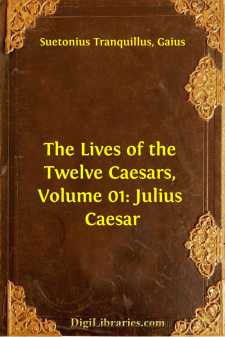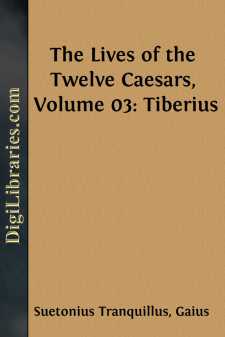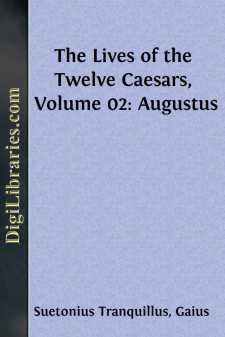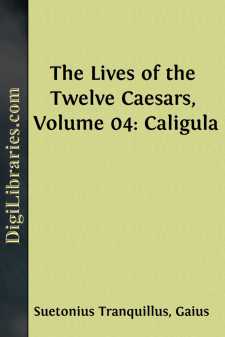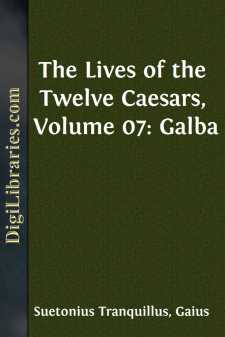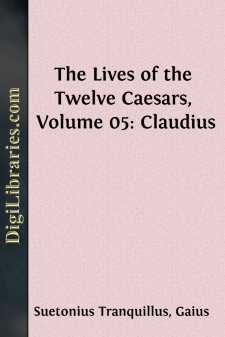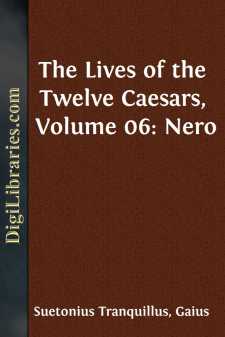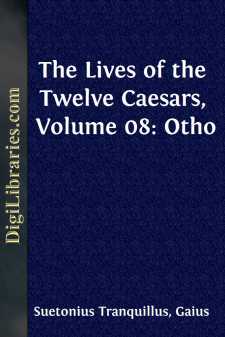Categories
- Antiques & Collectibles 13
- Architecture 36
- Art 48
- Bibles 22
- Biography & Autobiography 813
- Body, Mind & Spirit 142
- Business & Economics 28
- Children's Books 17
- Children's Fiction 14
- Computers 4
- Cooking 94
- Crafts & Hobbies 4
- Drama 346
- Education 46
- Family & Relationships 57
- Fiction 11829
- Games 19
- Gardening 17
- Health & Fitness 34
- History 1377
- House & Home 1
- Humor 147
- Juvenile Fiction 1873
- Juvenile Nonfiction 202
- Language Arts & Disciplines 88
- Law 16
- Literary Collections 686
- Literary Criticism 179
- Mathematics 13
- Medical 41
- Music 40
- Nature 179
- Non-Classifiable 1768
- Performing Arts 7
- Periodicals 1453
- Philosophy 64
- Photography 2
- Poetry 896
- Political Science 203
- Psychology 42
- Reference 154
- Religion 513
- Science 126
- Self-Help 84
- Social Science 81
- Sports & Recreation 34
- Study Aids 3
- Technology & Engineering 59
- Transportation 23
- Travel 463
- True Crime 29
Gaius Suetonius Tranquillus
Gaius Suetonius Tranquillus was a Roman historian and biographer born around AD 69, known for his significant work, "De Vita Caesarum" (The Lives of the Twelve Caesars), which provides detailed biographies of Julius Caesar and the first eleven Roman emperors. Serving under Emperor Hadrian as a secretary and later as the director of the imperial archives, Suetonius had access to numerous official documents, allowing him to create rich and sometimes scandalous accounts of his subjects' lives. His writings offer valuable insights into the personal and political intrigues of the early Roman Empire, blending historical facts with anecdotal and sometimes sensational details.
Author's Books:
Sort by:
C. Suetonius Tranquillus was the son of a Roman knight who commanded a legion, on the side of Otho, at the battle which decided the fate of the empire in favour of Vitellius. From incidental notices in the following History, we learn that he was born towards the close of the reign of Vespasian, who died in the year 79 of the Christian era. He lived till the time of Hadrian, under whose administration...
more...
CAIUS JULIUS CAESAR. I. Julius Caesar, the Divine [3], lost his father [4] when he was in the sixteenth year of his age [5]; and the year following, being nominated to the office of high-priest of Jupiter [6], he repudiated Cossutia, who was very wealthy, although her family belonged only to the equestrian order, and to whom he had been contracted when he was a mere boy. He then married (2) Cornelia,...
more...
TIBERIUS NERO CAESAR. (192) I. The patrician family of the Claudii (for there was a plebeian family of the same name, no way inferior to the other either in power or dignity) came originally from Regilli, a town of the Sabines. They removed thence to Rome soon after the building of the city, with a great body of their dependants, under Titus Tatius, who reigned jointly with Romulus in the kingdom; or,...
more...
I. That the family of the Octavii was of the first distinction in Velitrae [106], is rendered evident by many circumstances. For in the most frequented part of the town, there was, not long since, a street named the Octavian; and an altar was to be seen, consecrated to one Octavius, who being chosen general in a war with some neighbouring people, the enemy making a sudden attack, while he was...
more...
CAIUS CAESAR CALIGULA. (251) I. Germanicus, the father of Caius Caesar, and son of Drusus and the younger Antonia, was, after his adoption by Tiberius, his uncle, preferred to the quaestorship [377] five years before he had attained the legal age, and immediately upon the expiration of that office, to the consulship [378]. Having been sent to the army in Germany, he restored order among the legions,...
more...
SERGIUS SULPICIUS GALBA. (400) I. The race of the Caesars became extinct in Nero; an event prognosticated by various signs, two of which were particularly significant. Formerly, when Livia, after her marriage with Augustus, was making a visit to her villa at Veii [639], an eagle flying by, let drop upon her lap a hen, with a sprig of laurel in her mouth, just as she had seized it. Livia gave orders to...
more...
I. Livia, having married Augustus when she was pregnant, was within three months afterwards delivered of Drusus, the father of Claudius Caesar, who had at first the praenomen of Decimus, but afterwards that of Nero; and it was suspected that he was begotten in adultery by his father-in-law. The following verse, however, was immediately in every one's mouth: Tois eutychousi kai primaena paidia....
more...
NERO CLAUDIUS CAESAR. (337) I. Two celebrated families, the Calvini and Aenobarbi, sprung from the race of the Domitii. The Aenobarbi derive both their extraction and their cognomen from one Lucius Domitius, of whom we have this tradition: —As he was returning out of the country to Rome, he was met by two young men of a most august appearance, who desired him to announce to the senate and people a...
more...
AULUS VITELLIUS. (427) I. Very different accounts are given of the origin of the Vitellian family. Some describe it as ancient and noble, others as recent and obscure, nay, extremely mean. I am inclined to think, that these several representations have been made by the flatterers and detractors of Vitellius, after he became emperor, unless the fortunes of the family varied before. There is extant a...
more...
A. SALVIUS OTHO. (416) I. The ancestors of Otho were originally of the town of Ferentum, of an ancient and honourable family, and, indeed, one of the most considerable in Etruria. His grandfather, M. Salvius Otho (whose father was a Roman knight, but his mother of mean extraction, for it is not certain whether she was free-born), by the favour of Livia Augusta, in whose house he had his education, was...
more...



